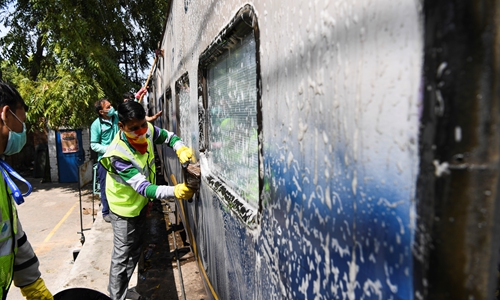HOME >> CHINA
Why some patients test positive again after recovering from COVID-19? Are such cases still infectious?
By Dong Changxi and Zhang Jian in Wuhan Source:Global Times Published: 2020/3/22 19:23:41

Railway workers clean the exterior of a train carriage as a preventive measure against COVID-19 at a yard in New Delhi, India on Monday. Photo: AFP
There have been reports across China recently indicating that a small number of patients who had recovered from the novel coronavirus pneumonia and released from hospital later on tested positive for COVID-19 again. Chinese experts said on Sunday that such cases are not unexpected, will not likely be infectious and may even lead to a cure for the disease, as samples collected from these patients' feces could potentially grant people immunity.About 5-10 percent of recovered COVID-19 patients tested positive again
While no authoritative statistics are currently available on an overall possibility for recovered patients to be rendered COVID-19 positive again, multiple quarantine stations in Hubei Province's Wuhan have reported the figure being around 5-10 percent.
These frontline stations said no single case as of yet had occurred in which a recovered patient who became COVID-19 positive again infected another person.
Yang Zhanqiu, a virologist at Wuhan University, said that factors including test methods and samples could result in a false positive or false negative test result.
The premise for a recovered patient to become positive again is that he or she was once tested positive, and became negative after treatment or even without treatment, but later on became positive once again, Yang said.
But calling all of these cases "re-infections" so fast might not be appropriate, and people should wait a little longer, like several months, to see if the result is still positive, Yang said.
Some coronaviruses could remain in the human body, particularly in the intestines, for a long time
A Chinese immunology expert who asked not to be named told reporters that some coronaviruses might remain in the human body, particularly the intestine, for an extended period of time.
For example, scientists had used electron microscopes to observe intestinal coronaviruses in the feces of a group of people from southern India. It turned out that some people could continuously excrete coronavirus particles.
However, these coronavirus particles are mostly without nucleic acid, meaning they were empty coats of proteins of empty viruses.
In theory, if healthy people consume these empty virus coat proteins, they could get immunity against the correspondent coronavirus, the expert said, noting that this could possibly be a kind of natural "vaccine" that helped local people gaining herd immunity against coronaviruses.
Lowered immunity may still result in symptoms
If the reason didn't come from testing procedures and related methods, people need to think about these cases from the perspective of the patients' immunity and the incubation period of the virus, especially when the patients again suffer from symptoms like fever, experts said.
Since there is still no effective medicine against COVID-19, patients' recoveries fully rely on their own immune system to clean the pathogens. But as for now, patients are being announced recovered and released from hospital without testing immune indexes like the valence of antibodies or the number of immune cells.
When people get infected with COVID-19, their bodies' immune system could see severe dysfunction. When some patients were released from hospital, the coronavirus was only temporarily suppressed by the immune system, so the tests were not able to detect them in some tissues or cells.
In these cases, if the patients did not fully recover or have enough rest, immunity may lower again, especially in the elderly, people in poor health or those who used glucocorticoid. They could potentially be infected with the latent coronavirus once again.
To make matters worse, these cases actually have the possibility to become infectious and capable of spreading the virus again, experts said.
Despite this, experts believed that people should not panic about these cases, but pay much attention to them. People should consider using such mechanisms as concentrated recuperation and rehabilitation nursing, which aims at making sure that patients' immune systems also recover, meaning a full recovery while also enhancing social management of the sources of infection, experts said.
The model of tuberculosis treatment could be applied here: When patients are recovered and released from the hospital, they should all take further recovery phases in selected sanatoriums. This will not only enable them to better recover their immune systems, but is also easier to manage and lowers the risk of further infections.
During this recuperation phase, patients could use immunomodulators and enhanced nutritional support. When all of their immune indexes fully return to normal, and have truly returned to full health, they can return to home safely.
Based on research by the team led by Tong Xiaolin, an academician at the Chinese Academy of Sciences and head of a treatment group at the National Administration of Traditional Chinese Medicine, traditional Chinese medicine will lower the rate of testing positive again to about 2.5 percent.
Many medical personnel from Wuhan's Zhongnan Hospital, Leishenshan Hospital, Tongji Hospital, Hubei Maternity and Child Health Care Hospital and Hubei Provincial Hospital of Traditional Chinese Medicine told reporters that they have yet to receive any patient who has recovered from COVID-19 testing positive again.
Posted in: SOCIETY,CHINA FOCUS